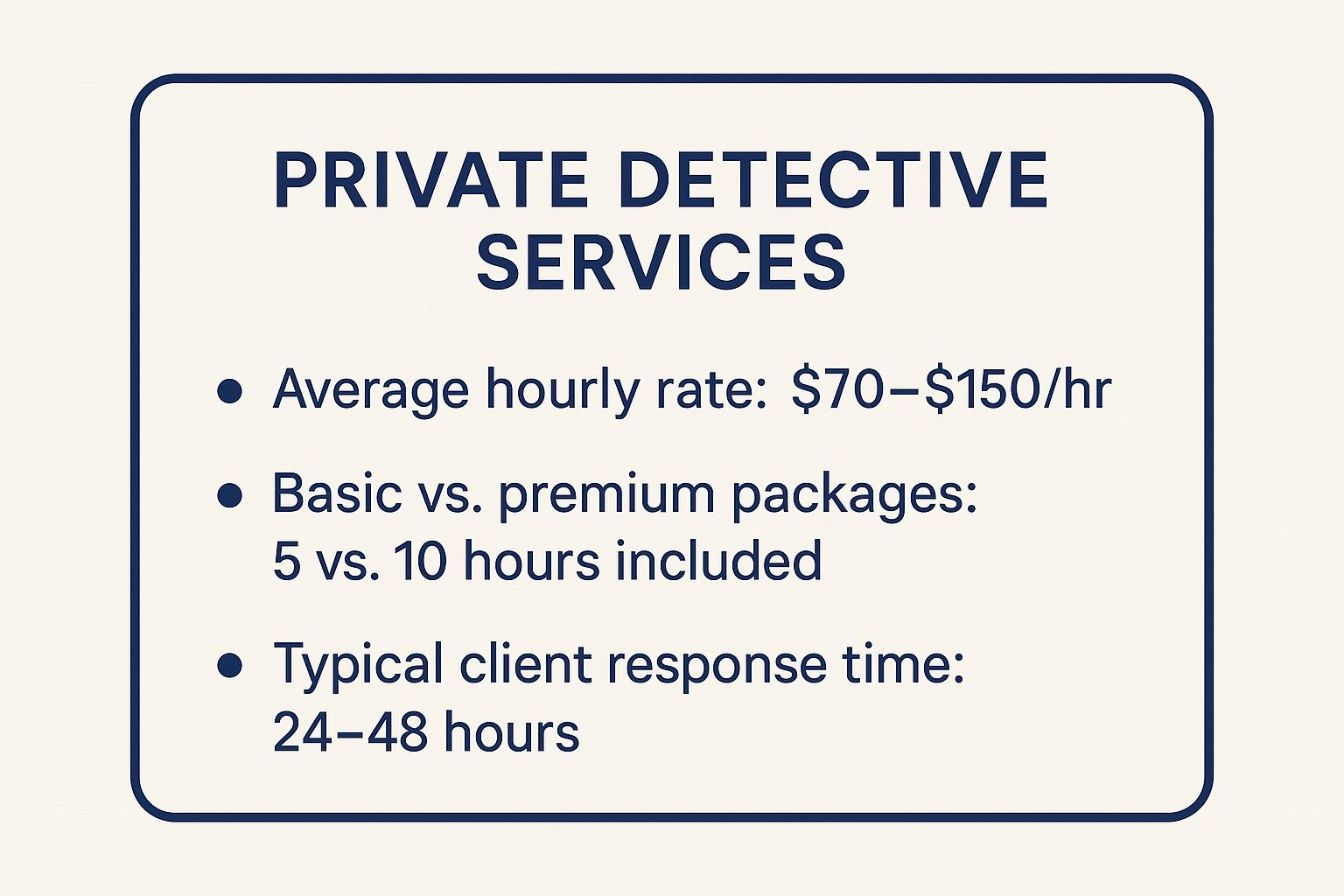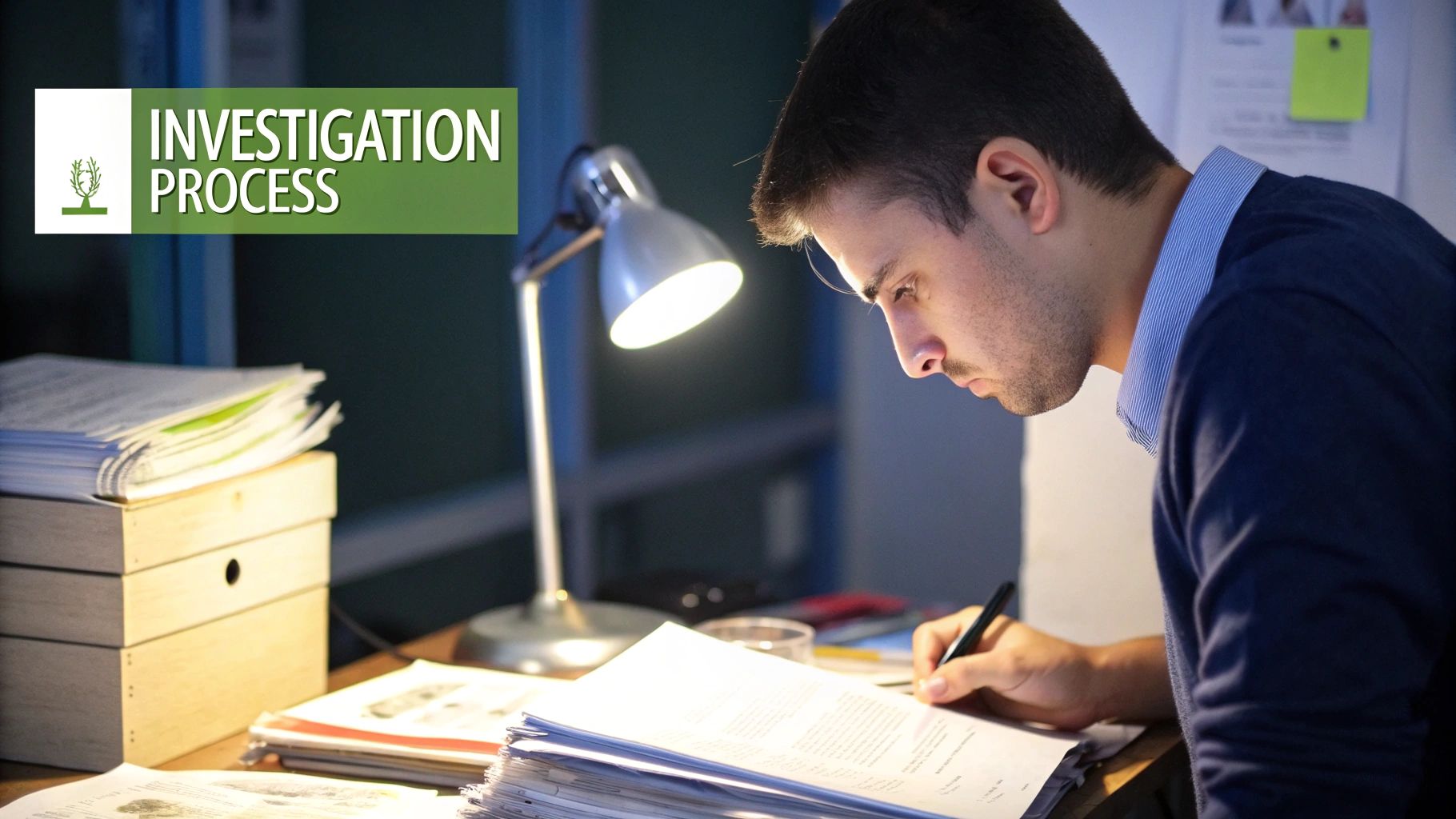Your Complete Guide to Finding Private Detectives Near Me
- Showix technical Team
- Jun 16, 2025
- 12 min read
Updated: Jul 28, 2025
Recognising When You Actually Need Professional Help
That nagging feeling…you know, the one that tells you something's just not right? We've all been there. Figuring out whether to tackle a suspicion head-on or bring in a professional can be tricky. Sometimes, a little digging on your own clears the air. Other times, going it alone can make things much worse. Knowing the difference is key.
Think of it like this: if you suspect a gas leak, you'd call a qualified engineer, right? Legal issues? You’d go straight to a solicitor. Private investigations are similar. There's a point where expert help is essential. Trying to gather evidence yourself in a complicated situation can be legally risky and could even jeopardise any future legal case.
The private investigation industry has seen a real boom lately, especially in the UK. This isn't surprising considering how complex modern life has become. Businesses and individuals alike are facing issues like fraud, internal misconduct, infidelity, and missing persons. Plus, technology like GPS tracking, social media analytics, and digital forensics has given investigators powerful new tools. This all adds up to private detectives being better equipped than ever to handle those intricate cases that are just beyond what most people can manage. For a deeper dive into this, check out this article: UK Private Investigation Industry Overview.
So, when should you start searching for "private detectives near me"? A good rule of thumb: ask yourself if your own efforts are creating more stress and confusion than clarity. Are you losing sleep, constantly speculating, and trying to connect the dots with limited information? Could your actions actually be putting your safety at risk, or damaging a potential legal case down the line? These are big red flags signalling it’s time for professional help.
Let's say you're dealing with suspected infidelity, a difficult business dispute, or need to verify someone's background. Maybe you even need to find a missing person. These scenarios often require specialised skills, legal know-how, and access to resources that most individuals simply don’t have. In these situations, connecting with a local private investigator is a smart move. If you're in the UK and looking for local support, you can contact a local private investigator for a confidential chat. Remember, getting help early can often lead to faster, more affordable solutions. Waiting too long can make things more complicated and ultimately increase the time and cost involved in getting the answers you need.
Finding Quality Investigators Beyond Google Searches

Sure, tools like Visusly can be helpful, and Googling "private detectives near me" is a natural first step. But let's be honest, it's a bit like picking a restaurant based solely on its location – convenient, not necessarily quality. The best investigators, like the best chefs, are often too busy doing the work to worry about topping search results.
So, how do you find those hidden gems? Think networking. Solicitors, for example, often work hand-in-hand with investigators and can offer invaluable recommendations based on real experience. Another avenue is looking at vetted online directories. These directories often require investigators to prove licensing, insurance, and professional memberships, offering you an extra layer of confidence.
Now, even within directories, you’ll need to sift the wheat from the chaff. A flashy website packed with stock photos and generic promises doesn't equal experience. Look for specifics: what's their background? What are their specialties? And – this is crucial – how do they communicate? A good investigator will be willing to discuss your unique needs and explain their process clearly. For more on this, check out our guide on how to hire a private detective in the UK.
Finally, don't underestimate the power of local knowledge. A local firm will have a deeper understanding of the area, the legal landscape, and the specific challenges your case might present. This is especially important for surveillance, background checks, or anything involving local regulations. Larger firms have their place, but local expertise can be a game-changer. Remember, hiring a private investigator isn't about finding the cheapest option; it's about finding the most effective one. You can contact a local private investigator to discuss your situation and get tailored advice.
Separating Real Professionals From Wannabes

Finding a legitimate private investigator can feel like navigating a minefield. You’re bombarded with "private detectives near me" ads, each promising the moon. But how do you separate the wheat from the chaff? It's a bit like online dating – everyone looks great in their profile picture, but who can you actually trust? Picking the wrong investigator can cost you – not just money, but valuable time and peace of mind.
Look for relevant training. Has the investigator invested in specialist courses in areas like surveillance, counter surveillance, interviewing, or digital forensics? This shows a genuine commitment to their profession.
Membership in professional organisations, such as the Association of British Investigators, is another positive sign. These bodies often enforce codes of conduct and require continuing professional development, providing an extra layer of accountability. Be wary, though, of fancy-sounding certifications from unknown organisations – these can be easily faked. Do your homework! Understanding the Role of a Private Investigator in Modern Cases can provide additional helpful context.
The private investigation industry in the UK is experiencing significant growth, with projected revenues for investigation activities expected to hit around $351.24 million USD in the next few years. Discover more insights on this growth. This increased demand, while good for legitimate professionals, unfortunately attracts its share of less-than-reputable individuals looking for an easy payday. This makes verifying credentials even more critical. Don't just take their word for it; contact professional associations directly to confirm.
Finally, remember specialisation. An investigator who's a whiz at corporate fraud might not be the right fit for a sensitive family issue. Look for an investigator whose experience aligns with your specific needs. Don’t hesitate to ask for case studies or testimonials related to your situation. A true professional will be happy to showcase their expertise and be honest about what they can realistically achieve. Ready to start your search? You can contact a local private investigator for a confidential consultation.
Having Conversations That Reveal Everything

The infographic above gives you a snapshot of the private investigation world—average hourly rates, typical service packages, and expected response times. It's helpful for setting realistic expectations before you even start making calls. Finding the right PI isn't just about ticking off qualifications; it's about the nitty-gritty of cost and communication, too.
That first conversation with a potential PI is make-or-break. It's like a first date – you’re checking for a connection beyond the surface. Are they really interested in your case, or just going through the motions? Are they listening intently, or just nodding politely? This isn't just about rates and schedules; it's about finding the right fit.
A good investigator will ask insightful questions, dig into the specifics of your situation, and show they understand the nuances. They won't shy away from tough questions or offer easy answers. The consultation should feel like a collaborative discussion, not a sales pitch.
Reading Between the Lines
Pay attention to how they communicate. Are they professional, responsive, and easy to understand? Or do they hide behind jargon and vague answers? These little things can tell you a lot about their overall approach.
Before you go any further, discuss their proposed strategy for your case. A competent PI will lay out a realistic plan based on your specific needs and goals. They’ll explain the steps involved, the potential roadblocks, and be upfront about costs and timelines. No over-promising or guaranteeing unrealistic outcomes. This honesty is crucial for building trust and managing expectations. You can find more helpful info on locating PIs in your area on the Sentry Private Investigator's website.
Spotting the Red Flags
Beware of investigators who offer quick fixes or downplay the complexities of your situation. That's a huge red flag. Also, steer clear of anyone who seems more interested in getting paid than actually helping you. A true professional puts your needs first and is dedicated to uncovering the truth, no matter how tangled the path.
Here’s a handy table to guide your conversations:
Essential Questions to Ask Potential Private Detectives
A comprehensive comparison of key interview questions and what their answers reveal about investigator quality and suitability
Question Category | Key Questions | Red Flag Responses | Professional Responses |
|---|---|---|---|
Experience & Specialisation | "What's your experience with cases like mine?" | "I've handled all sorts of cases, so this is no problem." (Too general) | "I've successfully handled several similar cases involving [specific type of case]. I understand the specific legal and logistical challenges involved." |
Investigative Approach | "Can you describe your proposed approach to my case?" | "We'll just follow the subject and see what they do." (Vague and simplistic) | "My initial plan involves [specific steps, e.g., background checks, surveillance, interviews]. I'll adjust the approach as needed based on the findings." |
Communication & Reporting | "How will you keep me updated on the progress?" | "I'll contact you when I have something to report." (Unclear and passive) | "I'll provide regular updates [e.g., weekly reports, phone calls] and am always available to answer your questions." |
Fees & Costs | "What are your fees and how are they structured?" | "We'll figure out the costs as we go." (Evasive and potentially open-ended) | "My fees are [specific rate] per hour/day/case. Here's a breakdown of potential additional expenses..." (Transparent and detailed) |
This table outlines the kinds of questions you should be asking and what a good answer (versus a bad one) sounds like. It's all about getting a feel for their expertise and approach.
If you're ready to connect with a qualified investigator, you can contact a local private investigator. Remember, finding the right PI is like finding a trusted advisor – it takes careful thought, insightful questions, and paying close attention to both their skills and their character.
Understanding What You're Really Paying For

Let's be honest, hiring a private investigator isn't like picking up groceries. It's an investment. But like any investment, understanding the costs upfront can save you headaches (and budget blowouts) later. Think of it like buying a car – you wouldn't sign on the dotted line without understanding the financing, right?
Most private investigators operate on one of two pricing structures: hourly rates or retainers. Hourly rates are pretty self-explanatory – you pay for the investigator's time, often billed in blocks. Retainers, on the other hand, are upfront lump sums that cover a set number of hours or a specific part of the investigation. Maybe it's the initial surveillance phase, or perhaps it covers the cost of a background check.
There are also those inevitable expenses to factor in. Travel, database access fees, specialised equipment – it all adds up. A good investigator will be transparent about these from the get-go. Don't hesitate to ask for a detailed breakdown. Speaking of costs, you might find this helpful: How Much Does a Private Investigator Cost?
Decoding the Invoice
So, what actually influences the overall cost? Complexity is a big one. A simple background check won't cost the same as weeks of surveillance. Location plays a role, too. Investigations in bustling city centres like London often come with higher expenses due to logistical hurdles and travel. And finally, specialised skills, like digital forensics, demand a higher rate. It's like hiring any specialist – you're paying for their expertise.
Interestingly, the private investigation sector is experiencing some serious growth, both in the UK and globally. The global market, valued at about USD 9.7 Billion in 2023, is projected to hit USD 16.5 Billion by 2032, with a CAGR of 7.6% from 2024–2032. Pretty impressive, right? Discover more insights on market growth.
Negotiating a Fair Deal
Don't just fixate on the price tag when comparing quotes. Look at the investigator's experience, their proposed strategy, how they communicate. Sometimes, investing a bit more in a seasoned professional can actually save you money down the road. It's about getting real value, not just the lowest price.
To help you understand typical fee structures, let's take a look at this table:
Private Detective Fee Structure Comparison Breaking down different pricing models and what to expect for various types of investigations in the UK market
Service Type | Typical Rate Range | Payment Structure | Additional Costs |
|---|---|---|---|
Surveillance | £50-£150 per hour | Hourly or Retainer | Travel, equipment rental |
Background Checks | £200-£500 per case | Fixed Fee or Retainer | Database access fees |
Locating Missing Persons | £300-£1000+ per case | Retainer | Travel, database access |
Corporate Investigations | £75-£200 per hour | Hourly or Retainer | Legal fees, expert witnesses |
As you can see, the pricing varies quite a bit depending on the service. This table gives you a general idea, but always discuss specifics with the investigator directly.
Avoiding Costly Surprises
Before things kick off, have an open conversation about your budget and payment expectations. A reputable investigator will collaborate with you to set clear boundaries. This means agreeing on a maximum budget, a payment plan, and a clear process for approving any unexpected costs. This keeps everyone on the same page and avoids any financial shocks later on.
Ready to move forward? Contact a local private investigator for a consultation. Finding the right investigator is like finding the right partner for your specific needs. It's an investment in getting the answers you're looking for, not just ticking a box.
Building a Partnership That Gets Results
Picking your private investigator is a big deal, but honestly, it’s only the first step. The real journey begins after you’ve signed the contract, and your role in this partnership is way more crucial than you think. You’re not just a bystander; you're an active participant. Think of it like hiring a contractor to remodel your kitchen. You wouldn’t just hand over the keys and vanish, would you?
Good communication is the foundation of any successful investigation. This isn't about micromanaging, but about setting clear expectations from the get-go. Talk about how often you want updates and how you want to receive them. Some investigators prefer weekly phone calls, others prefer detailed written reports. Find a system that works for both of you.
Sharing all the necessary information with your investigator is also vital, but there's a fine line. You need to provide relevant details without accidentally jeopardising the investigation. Imagine trying to piece together a puzzle with missing pieces – that’s what it’s like for a PI when key information is withheld. Resist the urge to “help” by doing your own amateur sleuthing. This can complicate matters and potentially derail the entire process. Before hiring, it's also smart to have a general understanding of service costs. For example, this article on locksmith costs offers a glimpse into how service providers structure their pricing. While not directly related to PI work, it helps to have this context.
Managing Expectations and Emotions
Investigations, especially those involving sensitive personal matters, can be emotionally taxing. Keeping your expectations realistic is essential. Investigations take time, and there are no guarantees of a specific outcome. Your investigator should be honest about potential roadblocks and realistic timelines. It's like getting a medical diagnosis – you wouldn't expect a doctor to give you a definitive answer without running tests. Patience and trust in the process are key.
Confidentiality is also paramount. Talk to your investigator about how they’ll handle sensitive information and what steps they take to ensure discretion. A good investigator will handle your case with the utmost respect and confidentiality, understanding the potential emotional and legal implications. This should all be clearly laid out in your agreement.
Preparing for the Outcomes
Finally, be prepared for a range of possible outcomes. The investigation might confirm your suspicions, completely debunk them, or even unearth something totally unexpected. It's important to discuss these scenarios with your investigator and have a plan for how you’ll react to each one. Think of it like prepping for a court case – you need to consider all possible verdicts and have a strategy for each.
If you're ready to find a professional, you can contact a local private investigator. Building a strong partnership with your investigator is the biggest factor in a successful outcome. Open communication, realistic expectations, and mutual respect are the foundations of a productive working relationship.
Making Your Final Decision With Confidence
So, you’ve talked to a few local private investigators, done your research, and now you’re at the point of actually hiring someone. It’s a big decision, kind of like choosing the right roommate. You've met some seemingly good candidates, but who’s truly the best fit for your specific situation? This is where having a solid plan can really help. Remember, you're not looking for the perfect investigator (they don't exist!), but the one that best aligns with your case and your goals.
Reviewing your notes from initial consultations is crucial. Think about who really listened to your concerns and grasped the nuances of your situation. Who communicated clearly and professionally? Whose approach felt right? And don’t discount your gut feeling. Sometimes, instinct is incredibly accurate. If something feels off about a particular investigator, even if they look great on paper, trust your intuition.
Cost is, of course, a factor. But remember, value isn’t always about the lowest price. Sometimes, spending a bit more for a seasoned, specialised investigator is the smarter choice. It’s a bit like choosing a surgeon – you wouldn’t necessarily go with the cheapest option, but the one with the most experience and success in the specific procedure you need, right? The same logic applies here. A more experienced investigator might be more efficient, achieve better outcomes, and ultimately save you money in the long run.
Final Checks and Balances
Before signing on the dotted line, do your due diligence. Check their professional memberships, and even see if you can contact past clients for references. It's an extra step, but it can offer invaluable peace of mind.
Also, pay attention to any last-minute red flags. Does the investigator suddenly become difficult to reach or overly aggressive in their sales pitch? Are they making promises that sound too good to be true or downplaying potential difficulties? These could indicate underlying issues.
Moving Forward With Confidence
Once you've chosen your investigator, breathe easy and trust the process. Investigations take time. Maintain regular communication, but avoid micromanaging. Provide them with the information they need, but resist the urge to conduct your own amateur sleuthing – it can actually interfere with the professional's work. I've seen cases where well-meaning clients inadvertently compromised an investigation by trying to take matters into their own hands.
What If Things Go Wrong?
What happens if things don’t work out with your initial choice? It's okay, it happens. The key is open communication. Discuss your concerns directly with the investigator. If the issues can’t be resolved, don't hesitate to end the contract and find someone else. Having a clear exit strategy spelled out in your initial agreement will make this process much smoother.
Choosing a private investigator can feel daunting, but by following these guidelines, you can make a well-informed, confident decision that gets you closer to the truth. If you’re ready to speak with a local professional, you can contact a local private investigator for a confidential consultation. Remember, this is a partnership built on trust, open communication, and a shared understanding of your objectives.
Ready to take the next step? Visit Sentry Private Investigators Ltd to learn more about our services and how we can help you get the answers you're looking for.





Comments